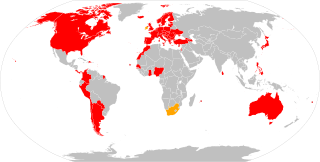Related Research Articles

The European Convention on Human Rights is an international convention to protect human rights and political freedoms in Europe. Drafted in 1950 by the then newly formed Council of Europe, the convention entered into force on 3 September 1953. All Council of Europe member states are party to the convention and new members are expected to ratify the convention at the earliest opportunity.

The International Covenant on Civil and Political Rights (ICCPR) is a multilateral treaty that commits nations to respect the civil and political rights of individuals, including the right to life, freedom of religion, freedom of speech, freedom of assembly, electoral rights and rights to due process and a fair trial. It was adopted by United Nations General Assembly Resolution 2200A (XXI) on 16 December 1966 and entered into force on 23 March 1976 after its thirty-fifth ratification or accession. As of June 2022, the Covenant has 173 parties and six more signatories without ratification, most notably the People's Republic of China and Cuba; North Korea is the only state that has tried to withdraw.
The Convention on the Prevention and Punishment of the Crime of Genocide (CPPCG), or the Genocide Convention, is an international treaty that criminalizes genocide and obligates state parties to pursue the enforcement of its prohibition. It was the first legal instrument to codify genocide as a crime, and the first human rights treaty unanimously adopted by the United Nations General Assembly, on 9 December 1948, during the third session of the United Nations General Assembly. The Convention entered into force on 12 January 1951 and has 152 state parties as of 2022.

The Convention Against Torture and Other Cruel, Inhuman or Degrading Treatment or Punishment is an international human rights treaty under the review of the United Nations that aims to prevent torture and other acts of cruel, inhuman, or degrading treatment or punishment around the world.

The Copenhagen criteria are the rules that define whether a country is eligible to join the European Union. The criteria require that a state has the institutions to preserve democratic governance and human rights, has a functioning market economy, and accepts the obligations and intent of the European Union.
There is no universal agreement on the legal definition of terrorism, although there exists a consensus academic definition created by scholars.

United Nations Security Council Resolution 1373, adopted unanimously on 28 September 2001, is a counterterrorism measure passed following the 11 September terrorist attacks on the United States. The resolution was adopted under Chapter VII of the United Nations Charter, and is therefore binding on all UN member states.

The Anti-terrorism, Crime and Security Act 2001 is an Act of Parliament of the United Kingdom, formally introduced into Parliament on 19 November 2001, two months after the terrorist attacks in the United States on 11 September. It received royal assent and came into force on 14 December 2001. Many of its measures are not specifically related to terrorism, and a Parliamentary committee was critical of the swift timetable for such a long bill including non-emergency measures.

The United Nations Office on Drugs and Crime is a United Nations office that was established in 1997 as the Office for Drug Control and Crime Prevention by combining the United Nations International Drug Control Program (UNDCP) and the Crime Prevention and Criminal Justice Division in the United Nations Office at Vienna, adopting the current name in 2002.

Human rights in the United Kingdom concern the fundamental rights in law of every person in the United Kingdom. An integral part of the UK constitution, human rights derive from common law, from statutes such as Magna Carta, the Bill of Rights 1689 and the Human Rights Act 1998, from membership of the Council of Europe, and from international law.
The Protocol to Prevent, Suppress and Punish Trafficking in Persons, Especially Women and Children is a protocol to the United Nations Convention Against Transnational Organized Crime. It is one of the three Palermo protocols, the others being the Protocol Against the Smuggling of Migrants by Land, Sea and Air and the Protocol Against the Illicit Manufacturing of and Trafficking in Firearms.
Anti-terrorism legislation are laws with the purpose of fighting terrorism. They usually, if not always, follow specific bombings or assassinations. Anti-terrorism legislation usually includes specific amendments allowing the state to bypass its own legislation when fighting terrorism-related crimes, under alleged grounds of necessity.

The Convention on Cybercrime, also known as the Budapest Convention on Cybercrime or the Budapest Convention, is the first international treaty seeking to address Internet and computer crime (cybercrime) by harmonizing national laws, improving investigative techniques, and increasing cooperation among nations. It was drawn up by the Council of Europe in Strasbourg, France, with the active participation of the Council of Europe's observer states Canada, Japan, the Philippines, South Africa and the United States.

The International Convention for the Protection of All Persons from Enforced Disappearance (ICPPED) is an international human rights instrument of the United Nations intended to prevent forced disappearance, which, as defined in international law, is part of crimes against humanity. The text was adopted by the United Nations General Assembly on 20 December 2006 and opened for signature on 6 February 2007. It entered into force on 23 December 2010. As of January 2023, 98 states have signed the convention and 69 have ratified it.
In law, the principle of aut dedere aut judicare refers to the legal obligation of states under public international law to prosecute persons who commit serious international crimes where no other state has requested extradition. However, the Lockerbie case demonstrated that the requirement to extradite or prosecute is not a rule of customary international law. The obligation arises regardless of the extraterritorial nature of the crime and regardless of the fact that the perpetrator and victim may be of alien nationality. It is generally included as part of international treaties dealing with an array of transnational crimes to facilitate bringing perpetrators to justice.
The Nuclear Terrorism Convention is a 2005 United Nations treaty designed to criminalize acts of nuclear terrorism and to promote police and judicial cooperation to prevent, investigate and punish those acts. As of October 2022, the convention has 115 signatories and 120 state parties, including the nuclear powers China, France, India, Russia, the United Kingdom, and the United States. Most recently, Oman ratified the convention on 21 October 2022.

The Council of Europe Convention on Laundering, Search, Seizure and Confiscation of the Proceeds from Crime and on the Financing of Terrorism, also known as the Warsaw Convention or CETS 198, is a Council of Europe convention which aims to facilitate international co-operation and mutual assistance in investigating crime and tracking down, seizing and confiscating the proceeds thereof.
Capital punishment in Bangladesh is a legal form of punishment for anyone who is over 16, however in practice will not apply to people under 18. Crimes that are currently punishable by death in Bangladesh are set out in the Penal Code 1860. These include waging war against Bangladesh, abetting mutiny, giving false evidence upon which an innocent person suffers death, murder, assisted suicide of a child, attempted murder of a child, and kidnapping. The Code of Criminal Procedure 1898 provides that "he be hanged by the neck until he is dead." For murder cases, the Appellate Division requires trial courts to weigh aggravating and mitigating factors to determine whether the death penalty is warranted.

The Inter-American Convention on the Prevention, Punishment, and Eradication of Violence against Women, better known as the Belém do Pará Convention, is an international human rights instrument adopted by the Inter-American Commission of Women (CIM) of the Organization of American States (OAS) at a conference held in Belém do Pará, Brazil, on 9 June 1994. It is the first legally binding international treaty that criminalises all forms of violence against women, especially sexual violence. On 26 October 2004, the Follow-Up Mechanism (MESECVI) agency was established to ensure the State parties' compliance with the Convention.

Incitement to terrorism is a category in some national legal systems which may criminalize direct encouragement of acts of violence or praise for proscribed terrorist organizations. It was also prohibited by United Nations Security Council Resolution 1624 in 2005.
References
- ↑ Adrian Hunt, "The Council of Europe Convention on the Prevention of Terrorism" (2006) European Public Law 603.
- 1 2 "Full list".